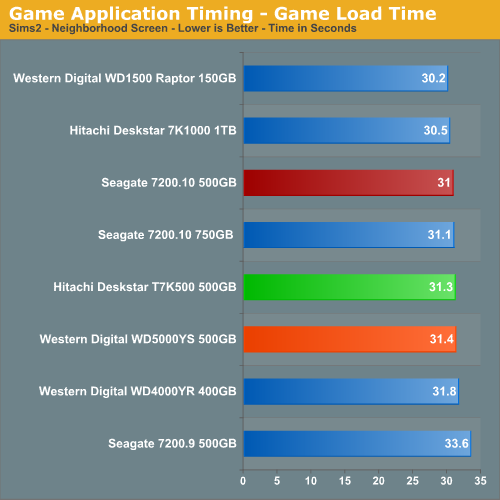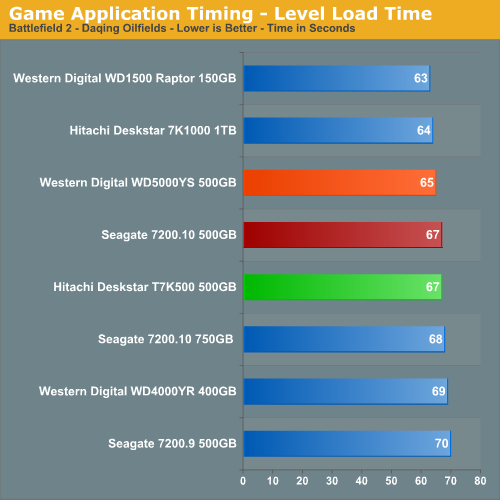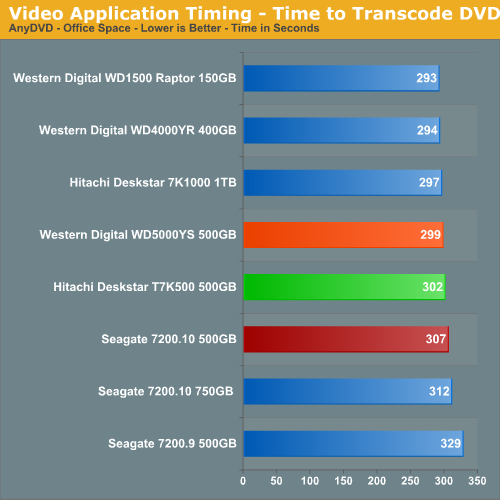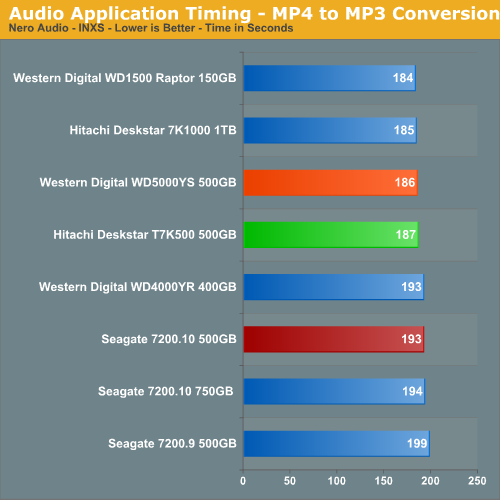Seagate 7200.10 500GB: Hitting the Sweet Spot
by Gary Key and Dave Robinet on July 6, 2007 11:00 PM EST- Posted in
- Storage
Actual Application Times
Our application benchmarks are designed to show application performance results with times being reported in seconds, with lower scores being better. While these tests will show some differences between the drives it is important to understand we are no longer measuring the pure performance of the hard drive but how well our platform performs with each individual drive. The performance of a hard drive is an integral part of the computer platform but other factors such as memory, CPU, core logic, and even driver choice can play a major role in determining how well the hard drive performs in any given task.
Game Load Test
Our Sims 2 - Open for Business test measures the time it takes to load the initial portion of the game. Our application timer starts when the game icon is initiated until the neighborhood menu appears.

The results are basically the same as our iPEAK results as the WD Raptor series continues to lead all drives; however, the performance differences are not as drastic once we take into account the entire platform. We notice the Seagate 500GB drive actually scoring slightly better than the Hitachi T7K500 after falling behind by about 38% in the iPEAK tests.
Game Level Load
This test centers on the actual loading of a playable level within our game selections. The Battlefield 2 test measures the time it takes to load the Daqing Oilfields level. Our application timer begins when the start single player icon is initiated and ends when the join game icon is visible.

The WD1500ADFD Raptor continues its pattern of being the best available drive for the gaming enthusiast and our subjective opinion also matches the test scores. That said, the larger capacity advantages of the 7200rpm drives certainly make up for the minimal loss in performance. Once again, our Seagate 7200.10 500GB drive is performing well and matches the performance of the Hitachi drive.
AnyDVD 6.1
Our next test utilizes the "ripping" function of AnyDVD to copy the Office Space DVD file from our source drive to our test drive. Our DVD features 29 files totaling 7.55GB of data and is an excellent test for determining the write speed of a drive.

Our Seagate Barracuda 7200.10 500GB drive finishes near the bottom of the pack along with the other Seagate drives. The Seagate drives just do not perform as well in actual application write speeds as their iPEAK results would indicate. The review drive is five seconds slower than the Hitachi in this test - a difference of 1.6%.
Nero Audio Encode
Our last test has us utilizing the audio encoding functions of Nero to convert our INXS Greatest Hits audio files in MP4 format to a high quality variable rate MP3 file for our portable player. Our test features 16 files totaling 137MB of data and is an excellent test for determining the read and write speed of a drive.

The test results show once again the amount of time a fast hard drive like the WD Raptor can save over the course of audio or video file manipulation session. Our Seagate 7200.10 500GB drive finishes six seconds behind the T7K500 - a difference of 3.2% - with results that mirror the Video tests.
Quick Take
The performance of the Seagate Barracuda 7200.10 500GB is good but not outstanding when compared to other drives in its class. In fact, based upon our preliminary test results with the latest Samsung and Western Digital drives, the drive almost seems a generation behind now. This will be resolved later this summer when Seagate introduces the new 7200.11 series that should retake the performance crown on the general desktop.
However, we have to realize that Seagate released this 7200.10 drive about a year before the Samsung and WD offerings so its true competition is the Hitachi T7K500 drive. Overall, the Hitachi T7K500 is the better performing drive but it comes at a $20 price premium and provides a three year warranty compared to five for the Seagate drive. The thermal and acoustic results favor the Hitachi drive but not significantly in our opinion, though our ears were bothered by the Seagate's "louder" than normal seeks.
We did notice in certain benchmarks that the Seagate 7200.10 drives have a tendency to perform poorly compared to the other drives when the seek distances are not clustered tightly or on the same track. This results in the requests not being available on the expected track or in cache, causing the drive to seek the information across the disc resulting in a traffic jam effect caused by the track to track seeks and resulting rotational latencies. In our testing, the Seagate 7200.10 drive seems to thrive on consistent read/write requests for medium to large size blocks of information providing seek distances are closely clustered. In our application test benchmarks, the drive fared better in the gaming benchmarks, indicating that while the pure hard drive performance is lacking when compared to the other 7200rpm drives, the drive would still be a very solid choice for a gaming machine.
Our application benchmarks are designed to show application performance results with times being reported in seconds, with lower scores being better. While these tests will show some differences between the drives it is important to understand we are no longer measuring the pure performance of the hard drive but how well our platform performs with each individual drive. The performance of a hard drive is an integral part of the computer platform but other factors such as memory, CPU, core logic, and even driver choice can play a major role in determining how well the hard drive performs in any given task.
Game Load Test
Our Sims 2 - Open for Business test measures the time it takes to load the initial portion of the game. Our application timer starts when the game icon is initiated until the neighborhood menu appears.

The results are basically the same as our iPEAK results as the WD Raptor series continues to lead all drives; however, the performance differences are not as drastic once we take into account the entire platform. We notice the Seagate 500GB drive actually scoring slightly better than the Hitachi T7K500 after falling behind by about 38% in the iPEAK tests.
Game Level Load
This test centers on the actual loading of a playable level within our game selections. The Battlefield 2 test measures the time it takes to load the Daqing Oilfields level. Our application timer begins when the start single player icon is initiated and ends when the join game icon is visible.

The WD1500ADFD Raptor continues its pattern of being the best available drive for the gaming enthusiast and our subjective opinion also matches the test scores. That said, the larger capacity advantages of the 7200rpm drives certainly make up for the minimal loss in performance. Once again, our Seagate 7200.10 500GB drive is performing well and matches the performance of the Hitachi drive.
AnyDVD 6.1
Our next test utilizes the "ripping" function of AnyDVD to copy the Office Space DVD file from our source drive to our test drive. Our DVD features 29 files totaling 7.55GB of data and is an excellent test for determining the write speed of a drive.

Our Seagate Barracuda 7200.10 500GB drive finishes near the bottom of the pack along with the other Seagate drives. The Seagate drives just do not perform as well in actual application write speeds as their iPEAK results would indicate. The review drive is five seconds slower than the Hitachi in this test - a difference of 1.6%.
Nero Audio Encode
Our last test has us utilizing the audio encoding functions of Nero to convert our INXS Greatest Hits audio files in MP4 format to a high quality variable rate MP3 file for our portable player. Our test features 16 files totaling 137MB of data and is an excellent test for determining the read and write speed of a drive.

The test results show once again the amount of time a fast hard drive like the WD Raptor can save over the course of audio or video file manipulation session. Our Seagate 7200.10 500GB drive finishes six seconds behind the T7K500 - a difference of 3.2% - with results that mirror the Video tests.
Quick Take
The performance of the Seagate Barracuda 7200.10 500GB is good but not outstanding when compared to other drives in its class. In fact, based upon our preliminary test results with the latest Samsung and Western Digital drives, the drive almost seems a generation behind now. This will be resolved later this summer when Seagate introduces the new 7200.11 series that should retake the performance crown on the general desktop.
However, we have to realize that Seagate released this 7200.10 drive about a year before the Samsung and WD offerings so its true competition is the Hitachi T7K500 drive. Overall, the Hitachi T7K500 is the better performing drive but it comes at a $20 price premium and provides a three year warranty compared to five for the Seagate drive. The thermal and acoustic results favor the Hitachi drive but not significantly in our opinion, though our ears were bothered by the Seagate's "louder" than normal seeks.
We did notice in certain benchmarks that the Seagate 7200.10 drives have a tendency to perform poorly compared to the other drives when the seek distances are not clustered tightly or on the same track. This results in the requests not being available on the expected track or in cache, causing the drive to seek the information across the disc resulting in a traffic jam effect caused by the track to track seeks and resulting rotational latencies. In our testing, the Seagate 7200.10 drive seems to thrive on consistent read/write requests for medium to large size blocks of information providing seek distances are closely clustered. In our application test benchmarks, the drive fared better in the gaming benchmarks, indicating that while the pure hard drive performance is lacking when compared to the other 7200rpm drives, the drive would still be a very solid choice for a gaming machine.










19 Comments
View All Comments
TA152H - Sunday, July 8, 2007 - link
That's absurd, for a hard drive company to make consistently lousy drives would kill it. There is reputation, and reputation matters a hell of lot. Are you too young to remember the nickname "Crashtor" for Maxtor drives? They shrunk big time when their drives sucked. So, no, they can't afford to make sucky drives that break all the time, but even within the context of a warranty, why do you suppose Western Digital and Hitachi don't do it if it's so inexpensive? Hmmmmm, maybe because they can't?Seagate has never had the notoriety for failures that IBM or Western Digital has. IBM's were of course more publicized, but even Western Digital's were fairly well known. Since people who are buying drives for servers and such are generally much smarter than the average person, and have good memories (scars?) when hardware fails, there is still some residual antipathy for IBM/Hitachi hard disks, and Western Digital. I haven't heard anything bad about Samsung, but I bought three of them and they all sucked. One was DOA, the other stopped working after a year, and the other had such an annoying whine to it, I eventually pulled it and used it as a projectile against encroaching squirrels. If other people have these experiences with Samsung, and people do tell other people they know, they may also have a less than stellar reputation, despite not being as publicized as IBM or Western Digital. Seagate, despite being the best known hard disk maker since the creation of the IBM PC XT, has managed to gain an excellent reputation for their drives. My only fear is that since they bought "Crashtor", it might take a few years to get back on track after absorbing that miserable company, so I've been avoiding them for a while. To this date, I have never had a Seagate hard drive fail, despite using them almost exclusively.
Anyone know what happened to Quantum? Boy did they suck. They whined worse than a kid at a carnival that didn't have enough money to buy cotton candy. What awful drives. Probably another company ate them.
ielmox - Tuesday, July 24, 2007 - link
Late 2001 - commissioned a system with the blisteringly fast IBM Deskstar. These drives smoked the competition and I was impressed with IBM engineering. Six months later, my system exploded and I became acquainted with the nickname "Deathstar".2002 - the contractor replaced the Deathstars with Crashtors. Failure less than 2 months later.
2002 - exasperated contractor installed Seagates, telling me that if these failed as well then my body must be emitting some sort of destructive magnetic field. The Seagates are still going strong today, and my PC is on for weeks at a time and under constant BitTorrent activity.
I like the performance indicated by recent AT and other articles for Samsung and Hitachi drives, but I respect the Seagate brand for its reliability and warranty. I'm really looking forward to seeing reviews of the Barracuda 7200.11, assuming of course that it ever makes the leap from press release concept to actual market product.
JakeBlade - Saturday, July 7, 2007 - link
Conveniently didn't include the latest 750GB Western Digital SE which blows away even the 1TB Hitachi.Also, I disagree with the weak brown nose attempt at the end by saying this turd 7200.10 drive "would still be a very solid choice for a gaming machine." Ummm, any gaming machine I build would have the 160GB WD or the Raptor. Then if you want mass storage for multimedia or binaries you get a Samsung T166 which is dead silent, has huge transfer rates, and is low priced.
DerekWilson - Saturday, July 7, 2007 - link
You really have to keep in mind that in a well designed game running on a system with a good amount of RAM, HD speed really won't impact gameplay. Yeah, install patching and load times will be affected, but generally gameplay is not a factor.We've seen it in real world benchmarks time and time again. If a game developer wants to make a playable game, there's just no way they can allow disk speed to become a performance factor.
The recent exception to this is S.T.A.L.K.E.R., which can hit the disk pretty hard when caching large areas of the map. Honestly, this was a poor design decision on the part of the developer. But you can actually adjust the behavior of the game here and get better performance with less caching. Tweakguides.com has a good description of how to do this.
Either way, a gamer is almost always better off putting more money into cpu, ram, or gpu.
TA152H - Saturday, July 7, 2007 - link
Good, thorough, review, but I have a couple of questions.Maybe the purpose of this question might make more sense if I first say I only buy Seagate hard disks, having had reliability problems with both Western Digital and IBM (Hitachi) and have been extremely happy with Seagate reliability (maybe it's no coincidence they offer longer warranties). Consequently, I don't care how these drives compare with them (although, certainly others will, so I'm not at all saying they shouldn't have been compared with them), but more curious about how it compared with the 7200.9.
The results were extremely impressive vis-a-vis the 7200.9, which concerns me because they seem too good. The problem is, it isn't too clear what exactly you picked for the 7200.9 . Did this also have a 16 mb cache? I suspect it was probably a little smaller and that might explain the huge (relatively) performance improvement of the 7200.9. It also might have been interesting to list the cache sizes of the competing drives, although it is probably possible for someone to look them up (again, since I wouldn't even consider them, I haven't bothered, but someone that would might be interested). 16 mb is kind of large, and might explain some of the "personality" of the hard disk, and why sometimes the lower raw performance is masked in certain benchmarks. I'm guessing, of course.
One other question that you might not know how to test for (I don't). If you have a hard disk that is sleeping and you request data for it that is on cache, does it spin up or is it smart enough to know this is unnecessary?
nrb - Saturday, July 7, 2007 - link
That Hitachi 7K1000 comes out of the benchmark rather well. Those accoustic scores are astonishing.Nossy - Saturday, July 7, 2007 - link
I guess I will wait for the new Seagate 7200.11 drives. This was a good review, but I don't understand why it's done now, right before a new generation of drives comes out?Regs - Friday, July 6, 2007 - link
Though it didn't come with any mount screws so I didin't install it yet.In the real world the guess the performance outside of a server would'nt be noticed. Fair assumption?
CrystalBay - Friday, July 6, 2007 - link
Cmon Regs, no mount screws ?